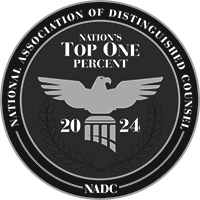- Joseph J. Hoffman, Jr.
- Kenneth A. DiMuzio, Sr.
- Ernest L. Alvino, Jr.
- Anooshay Asim
- Jeremiah J. Atkins
- Peter J. Bonfiglio III
- Vincent Campo
- James M. Carter
- Donald Caruthers, III
- John P. Ciocco
- Kenneth A. DiMuzio, Jr.
- Christine DiMuzio Sorochen
- Michael W. Glaze
- Leonard L. Grasso, Jr.
- Robert P. Grossman
- Joseph J. Hoffman, III
- Richard S. Hoffman, Jr.
- Ryan S. Hoffman
- Cristie R. Nastasi
- J. R. Powell
- Joseph J. Slachetka
- Charles J. Sprigman, Jr.
- James S. Taylor
- Robert J. Wiltsee
Today, Your Legal Corner will discuss “Attorney Conflicts of Interest.”
In a powerful scene from the movie Godfather, Michael Corleone tells his brother Fredo, “Don’t ever take sides with anyone against the family again-ever.” Loyalty to ones’ family is a central theme in the Godfather and part of what makes this movie so popular even today.
No man can serve two masters. While loyalty is a quality we look for in friends as well as family, it is just as important in hiring a lawyer. Does your attorney have relationships that impact his or her ability to provide their undivided loyalty to your case? It is important to know the rules before deciding whether this is the right person to advocate on your behalf.
Rules of Professional Conduct
All lawyers are governed by the Rules of Professional Conduct. Under these rules, attorneys are required to have undivided loyalty to their clients. Even if not requested by the client, an attorney has an affirmative duty to identify all conflicts of interest. This responsibility continues throughout the attorney-client relationship.
What is a conflict?
A conflict is where the interests of one party or entity interfere with the ability of a lawyer to offer objective representation to his or her client. It could be not only the interests of a current client but also a former client or a personal interest of the attorney. In each situation, the attorney is deemed to have a concurrent conflict of interest.
When such a conflict exists, the attorney is required to disclose this information to his or her client. The attorney should not just disclose whether a conflict exists but also the facts and circumstances surrounding the conflict as well. For example, if the attorney has represented the opposing side in another matter or is related to the judge hearing your case, either or both may be considered a conflict. If a lawyer fails to disclose the existence of a conflict, it could be considered malpractice and subject the lawyer to a legal claim.
What is Informed Consent?
Does the existence of a conflict of interest mean that attorney cannot represent you? No. As the client, you decide whether you want the attorney to represent you anyway. The agreement in which a client decides to waive a conflict is called informed consent.
The Rules of Professional Conduct define informed consent as an agreement by a client to a proposed course of representation after full disclosure and consultation with the attorney. If a potential conflict exists with current clients as in creating a will for a husband and wife, both must give informed consent to representation. This agreement must detail the advantages and risks of common representation by the same attorney.
Importantly, in order for the attorney to represent both parties he must reasonably believe he will be able to provide competent and diligent representation to each affected client. The representation cannot be prohibited by law and cannot involve the assertion of a claim by one client against another client.
Ultimately, the decision lies with the client to determine whether to continue being represented by an attorney with a conflict or to seek a new attorney.
Till next time, God bless, keep smiling, when Your Legal Corner, will discuss “Negotiations.”
Victoria M. Dalton is an attorney with the law offices of Hoffman DiMuzio.
Send questions, or comments to [email protected]. Or call 856-845-8243.
Please note that Your Legal Corner was created to provide educational articles about the law and is not legal advice. Check out more YLC articles here.
Submitting this form does not create an attorney-client relationship, but a lawyer from our firm will contact you as soon as possible.


















